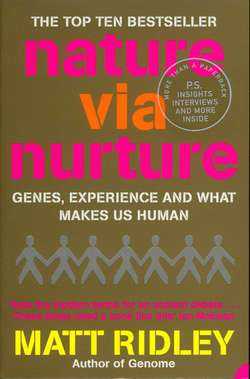Nature via Nurture: Genes, experience and what makes us human

Реклама. ООО «ЛитРес», ИНН: 7719571260.
Оглавление
Matt Ridley. Nature via Nurture: Genes, experience and what makes us human
Nature Via Nurture. Genes, Experience and What Makes Us Human. Matt Ridley
Table of Contents
PROLOGUE Twelve hairy men
CHAPTER ONE The paragon of animals
THE SIMIAN SOAP OPERA
SEX AND ITS EFFECTS
ENTER GENETICS
THROWING SWITCHES
CHAPTER TWO A plethora of instincts
MARTIANS AND VENUSIANS
MONEY OR DIAMOND?
FOLK PSYCHOLOGY
A MIND IN PARTS
PLATONIC UTOPIA
CHAPTER THREE A convenient jingle
SPLITTING PAIRS
COINCIDENCE
INTELLIGENCE
ACCENTUATING THE POSITIVE
EUTOPIA
CHAPTER FOUR The madness of causes
BLAME MOTHER
BLAME THE GENES
BLAME THE SYNAPSES
BLAME THE VIRUS
BLAME DEVELOPMENT
BLAME THE DIET
METHOD IN OUR MADNESS
MENTAL CONFUSION
CHAPTER FIVE Genes in the fourth dimension
THE EXCESSES OF NATIVISM
IN THE KITCHEN
SIGNPOSTS IN THE MIND
EX UNUM PLURIBUS
NEW NEURONS
INCUBATING UTOPIA
CHAPTER SIX Formative years
THE SCARS OF GESTATION
THE LONG FINGER OF LIFE
SEX AND THE WOMB
THROWING SWITCHES IN THE BRAIN
YOUNG TONGUES
FAMILIARITY BREEDS INDIFFERENCE
NAZITOPIA
CHAPTER SEVEN Learning lessons
MAKING BABIES CRY
REDESIGNING PEOPLE
NOTHING BUTTERY
NERVES, NETS AND NODES
NEWTONIAN UTOPIA
CHAPTER EIGHT Conundrums of culture
THE ACCUMULATION OF KNOWLEDGE
THE GREAT STANDSTILL
GENES THAT ALLOW CULTURE
SEX AND THE UTOPIA
CHAPTER NINE The seven meanings of ‘gene’
A GENE BY ANY OTHER NAME
GENES WITH ATTITUDE
ENTER POLITICS
CHAPTER TEN A budget of paradoxical morals
MORAL NO. 2: PARENTS
MORAL NO. 3: PEERS
MORAL NO. 4: MERITOCRACY
MORAL NO. 5: RACE
MORAL NO. 6: INDIVIDUALITY
MORAL NO. 7: FREE WILL
EPILOGUE Homo stramineus – the straw man
ACKNOWLEDGEMENTS
END NOTES. PROLOGUE
CHAPTER 1: THE PARAGON OF ANIMALS
CHAPTER 2: A PLETHORA OF INSTINCTS
CHAPTER 3: A CONVENIENT JINGLE
CHAPTER 4: THE MADNESS OF CAUSES
CHAPTER 5: GENES IN THE FOURTH DIMENSION
CHAPTER 6: FORMATIVE YEARS
CHAPTER 7: LEARNING LESSONS
CHAPTER 8: CONUNDRUMS OF CULTURE
CHAPTER 9: THE SEVEN MEANINGS OF GENE
CHAPTER 10: A BUDGET OF PARADOXICAL MORALS
EPILOGUE: HOMO STRAMINEUS – THE STRAW MAN
INDEX
P.S
Portrait. Natasha Loder talks to Matt Ridley
SNAPSHOT
Life Drawing
Top Ten Favourite Reads
A Critical Eye
Love, Actually
Have You Read? Genome
If You Loved This, You Might Like… Design for a Life: How Biology and Psychology Shape Human Behaviour
The Language Instinct
The Selfish Gene
Find Out More. The Human Genome Project Chromosome Viewer
NCBI (National Center for Biotechnology Information) Map Viewer
Sanger Institute genome database
About the Author
By the same author
Copyright
About the Publisher
Отрывок из книги
For Jim
Title Page
.....
There is a further consequence. Infanticide is common in gorillas as it is in many primates. A bachelor male infiltrates a harem, grabs a baby and kills it. This has two effects on the baby’s mother (apart from causing her great, though transient, distress): first, by halting her lactation it brings her back into oestrus; second, it persuades her that she needs a new harem master who is better at protecting her babies. And who better to choose than the raider? So she leaves her mate and marries her baby’s killer. Infanticide brings genetic rewards to males, who thereby become more fecund ancestors than males that do not kill babies; hence most modern gorillas are descended from killers. Infanticide is a natural instinct in male gorillas.
But in chimps females have ‘invented’ a counter-strategy that largely averts infanticide: they share their sexual favours widely. The result is that any ambitious male, if he were to start his reign with a killing spree, might be killing some of his own babies. Males that hold back from baby-killing therefore leave more offspring behind. To confuse paternity by seducing many males into possible fatherhood, the females have evolved exaggerated sexual swellings on their pink bottoms to advertise their fertile periods.20
.....